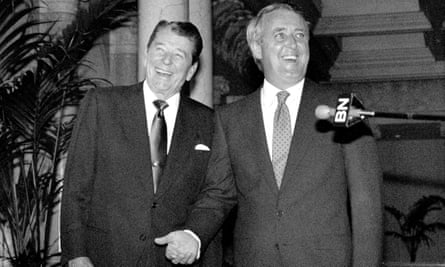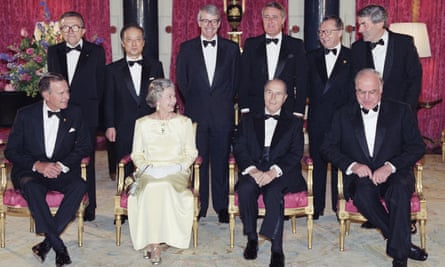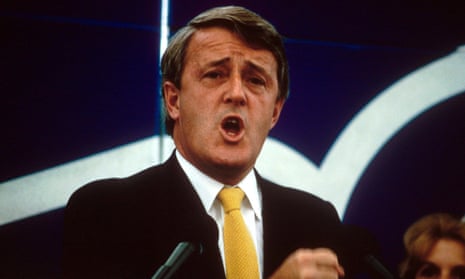Brian Mulroney, who has died aged 84, was both loved and reviled in his nine years as prime minister of Canada. A dealmaker who learned his political skills as a party organiser and labour lawyer before he ran for public office, Mulroney won back-to-back majority governments in the 1980s as leader of the Progressive Conservative party. He took office in 1984 in a landslide victory, but saw his popularity plummet by the early 1990s.
As prime minister, he raised his country’s international profile. A leading opponent of the apartheid regime in South Africa, he persuaded both Margaret Thatcher and the US president Ronald Reagan to support sanctions against the country, which led to the dismantling of apartheid and Nelson Mandela’s release from prison. He was also recognised as an early environmentalist, signing an acid rain treaty with the US in 1991.
As a global entrepreneur, he negotiated a free trade deal with the US in 1988, which later, as the North American Free Trade Agreement (Nafta), included Mexico – an arrangement that continues to exist despite Donald Trump’s determined efforts to destroy it after he won the Oval Office in 2016.
The original treaty was almost stillborn, as Mulroney recounted in his 2007 memoirs, because the US negotiators objected to a dispute resolution clause. Mulroney – a consummate negotiator – at that point threatened to call Reagan and ask: “Ron, how come the Americans can do a nuclear arms limitation deal with their worst enemy, the USSR, but can’t do a trade deal with their best friends, the Canadians?”

As Mulroney described it, half an hour later James Baker, the Treasury secretary and the chief negotiator for the Americans, burst into the room where the Canadian team was waiting, flung a piece of a paper on the table and said: “All right, you can have your goddamn dispute settlement mechanism. Now can we send the report to Congress?”
Yet for all his international successes, Mulroney left his party and his government in a shambles when he stepped down as prime minister in 1993. His domestic vision embraced a contentious campaign to replace a manufacturing tax with a goods and services tax (GST) on consumers. Wildly unpopular at the time, it proved its worth during the 2008 global economic crisis.
Mostly, though, his unpopularity stemmed from his inability to persuade the country to embrace his ardent desire to have his home province of Quebec recognised as “a distinct society” within Canada and to strike a new federal relationship with the provinces.
His attempts to achieve cohesion through a series of proposals, including the Meech Lake accord of 1987 and the Charlottetown accord and national referendum in 1992, failed because Canadians were tired of seemingly endless constitutional negotiations. They were smarting from the recession of the early 1990s and the imposition of the GST tax, and unnerved by the former prime minister Pierre Trudeau’s public and personally vicious campaign against Mulroney’s vision of Canada.

By 1992, Mulroney’s approval ratings had dropped to 12%, making him the most unpopular prime minister since polling had begun in the 1940s. He resigned in June 1993 and in the general election shortly afterwards the Progressive Conservatives, under Kim Campbell, suffered a disastrous defeat, losing all but two of their seats in parliament. Mulroney himself was later revealed to have had improper business dealings with a lobbyist after leaving office.
Born into a blue-collar Catholic family of Irish descent in Baie-Comeau, an isolated paper-mill town in north-eastern Quebec, Mulroney was the son of Benedict, an electrician, and his wife, Mary (nee O’Shea), and grew up speaking French and English. Money was tight so his father had two jobs, the family took in boarders and Brian, the third of six surviving children, worked after school to supplement the family coffers. He loved to sing and recalled performing an Irish song for the newspaper publisher Robert R McCormick, the founder of Baie-Comeau, who pressed a crisp $50 note into the boy’s palm.
Decades later, Mulroney organised a musical reprise at what became known as the Shamrock summit with President Reagan in Quebec City, which began on St Patrick’s Day in 1985. While many Canadian nationalists cringed in front of their television sets, Mulroney led his US counterpart and both of their wives in a singalong version of When Irish Eyes Are Smiling.
Mulroney’s family valued education and, despite their poverty, sent him to a Catholic boarding school in Chatham, New Brunswick, and then to St Francis Xavier University in Antigonish, Nova Scotia. He liked to quote his father’s view that “the only way out of a paper-mill town is through a university door”.
He took a degree in political science, and immersed himself in political activism, joining the Progressive Conservative party and attending the party leadership convention in 1956 in Ottawa. There he struck up a friendship with John Diefenbaker, who became prime minister the following year.
After graduating in 1960, Mulroney went to Dalhousie University in Halifax to study law, but spent more of his time organising the political campaigns of the Nova Scotia premier Robert Stanfield. He switched to Laval University in Quebec, and completed his law degree in 1964. A compulsive organiser and schmoozer, he also became the main financial support of his family after his father’s early death.
In Montreal, he joined the law firm Ogilvy Renault (which later became Norton Rose Fulbright) specialising in labour law, and earned a reputation for his ability to negotiate settlements and to resolve strikes, including serving on a commission in 1974 into violence and corruption in the construction industry at the James Bay project, one of the world’s biggest hydroelectric systems.
In 1976, never having run for elected office, he decided to enter the contest to succeed Stanfield as leader of the federal Progressive Conservatives, when Stanfield resigned after having lost the 1974 federal election to the Liberals under Trudeau. Mulroney ran a showy, expensive campaign, earning himself the sobriquet the Cadillac candidate, but lost to the much more modest Joe Clark, an MP from High River, Alberta.
Dejected and depressed, Mulroney took up an executive position at the Iron Ore Company of Canada, a subsidiary of three major US steel companies. His nearly 10 years at the helm gave him wide-ranging insights into global finance and economics, which informed his approach to, among other issues, free trade with the US. In 1983, Mulroney successfully contested the leadership of the party, and led it to a huge majority the following year.
A heavy smoker, he had become a problem drinker after losing the leadership of the party to Clark in 1976, but gave up entirely in 1980, on 24 June, the holiday in honour of St Jean Baptiste, the patron saint of Quebec, crediting his wife, Mila, with helping him restore his equilibrium. It took him another three years to quit smoking. As for his salty tongue, he never lost his taste for profanity, as the author and journalist Peter C Newman revealed in his controversial 2005 book The Secret Mulroney Tapes.
He was only 54 when he resigned as prime minister in 1993 and decided not to run for re-election to the House of Commons. He returned to the law and also served on corporate boards as well as operating as a highly paid consultant.
This included a notorious affiliation with the German-Canadian businessman Karlheinz Schreiber, from whom Mulroney secretly received tens of thousands of dollars in brown paper bags without declaring the money as income. The payments, it was alleged, were part of Schreiber’s efforts to win Canadian contracts for Airbus.
When the allegations first surfaced, Mulroney won a defamation case against the Liberal government in 1997 for revealing their investigation. But in 2010 an independent inquiry found that he had received C$225,000 shortly after he had left office as PM, and dismissed his explanation that accepting the cash was an error in judgment, opining that it was an attempt to hide the payments.
Despite the controversy, he went on to publish Memoirs, 1939-1993 (2007), delivered eulogies at the funerals of two former US presidents, Reagan and George HW Bush, and offered political counsel to both the re-invented Conservative party and to the prime minister Justin Trudeau, the son of his former rival.
Mulroney’s health deteriorated in the last decade, and he suffered from pancreatitis, prostate cancer and heart issues.
He is survived by Mila (nee Pivnicki), whom he married in 1973, and their four children, Ben, Caroline, Mark and Nicolas.
